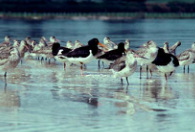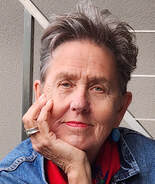For the first time, I've got an inkling of how one could become a birdwatcher - a species I have hitherto thought of as the sad and obsessive, ornithological equivalent of the trainspotter: slightly eccentric loners who prefer birds to people, infamous for their anoraks, notebooks and binoculars.

Neale Park, where I begin my wanderings with the dog each day, is only a couple of hundred metres from the sea but this fact is obscured because State Highway 6 stands between the park and the water’s edge. Or at least it obscures it from the pedestrian and earthbound users of the park like me. For the winged and the airborne however, the highway is no kind of barrier at all.
Sea birds and fresh water fowl strut the park, graze on it, fly over it or wade in its puddles and generally treat the park as an extension of the estuary. In the mornings when the goal posts on the park’s football fields still cast long shadows I’ve counted 70 gulls plucking at the dew-wet grass. Mid-afternoon on another day, I saw a squad of black birds with red bills attacking the fields with exactly the same industry. When a golfer practising his stroke on the park inadvertently lobbed a ball into their midst they whirled up into the sky in a many-winged black shadow.
Mallards and paradise ducks often potter about in pairs on the churned mud of the playing fields. Five small heron I saw one drizzly afternoon, stalking about on long frail legs were almost the same colour as the rain and looked like grey ghosts.
For the first time, I’ve got an inkling of how one could become a birdwatcher - a species I have hitherto thought of as the sad and obsessive, ornithological equivalent of the trainspotter: slightly eccentric loners who prefer birds to people, infamous for their anoraks, notebooks and binoculars. But I confess that, minus the binoculars, I am beginning to match the profile. I have, for example, begun consulting the Internet in an attempt to identify the birds we’ve encountered on our walks - www.nzbirdsonline.org.nz has been most helpful in this regard: the black, red-billed bird referenced above is apparently an oyster catcher which is monogamous, can live up to 30 years, nests in a hollow which it scrapes in the sand and lays 1-3 eggs at a time which take about 28 days to hatch. See what happens? You start with a mild curiosity about some dumb bird on a football field and soon you need to know all about its distribution, habitat, social structure, nest type, clutch size, incubation behaviour, longevity and the colour of its eggs.
The birds abandon the park for a few hours on Saturdays and at night. They cede the park each Saturday morning because the playing fields are thronged with football players caked in mud and spectators wrapped in hats and scarves and puffer jackets. The footballers practice some evenings too, huffing up and down the park in the semi-dark to the hoarse exhortations of coaches, or head-butting the scrum machine like calves at a feeding trough.
The floodlight above the changing shed shines like a small moon and the cabbage trees and flax bushes turn to spiky silhouettes when I take the dog for a late walk along the cycle-way beside the park. We’ll meet the occasional skateboarder thrumming along in the near-dark lighting his way with his cell-phone. Or a jogger. Cyclists overtake us with a slither of gears, the light from their headlamps fleeing ahead of them. But we don’t see or hear any birds.
We haven't yet seen the other winged creatures which occupy Neale Park at night. Perhaps because it’s too cold for the bats at the moment. An atavistic shudder runs through me at the very thought of rodents which can fly. However, Edith Shaw who also lives near Neale Park and who first spotted the bats, makes them sound utterly beautiful. They fly elegantly she says "like miniature ballet dancers". As they flit under the floodlights in pursuit of insects to eat, their fur gleams with a creamy gold iridescence. Note to self: may need a pair of binoculars in the near future.
For excellent information and identification of NZ birds visit www.nzbirdsonline.org.nz
 RSS Feed
RSS Feed

